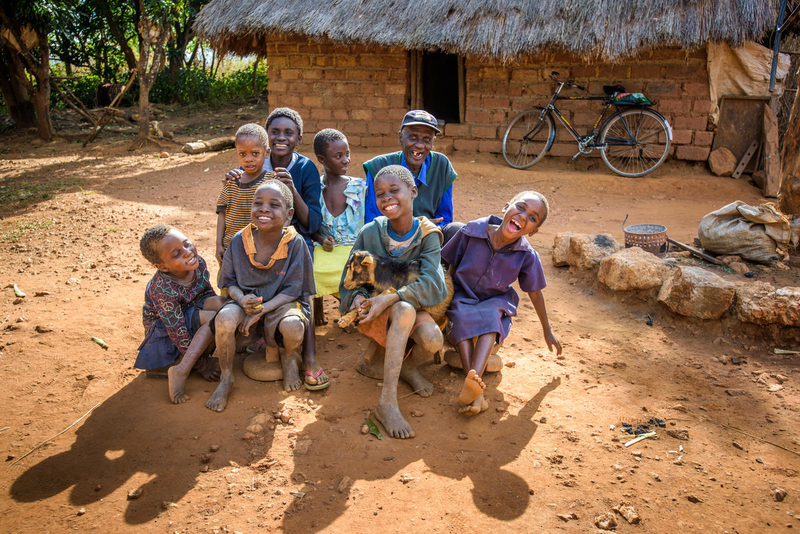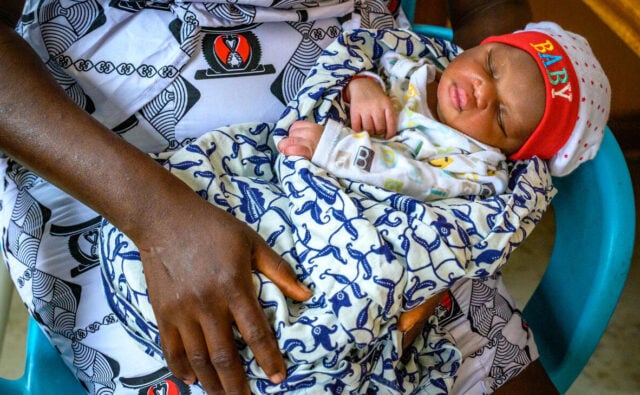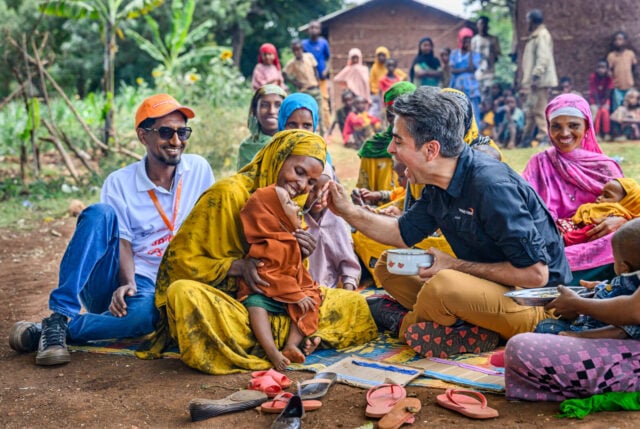Through a six-week Lent devotional, we invite you to prepare your heart for Easter in a new way and discover how the miracle of this time can be lived out year-round. Join us on a reflective journey through this season of Lent into Easter.
In 2020, Lent begins on Ash Wednesday, Feb. 26, and ends on Thursday, April 9. Easter is Sunday, April 12.
Week 1
… I was thirsty and you gave me something to drink. …—Matthew 25:35 (NIV)
READ: John 4:7-14
Jesus begins his conversation with the Samaritan woman at the well by asking for a simple drink of water in the hot midday sun. But then He goes deeper. He tells her that physical water can only quench thirst for a while — but He can offer “living water” that brings eternal life.
Jesus knew the woman needed — as we all do — both physical and spiritual water to live life “to the full” as God intends (John 10:10). Jesus crossed His day’s social boundaries of gender and ethnicity to speak to this woman as an equal and show that her deepest personal and spiritual needs could only be met by God’s Spirit.
THIRST
Today, over 2 billion people don’t have access to safe drinking water at their homes. For women and girls, this means walking long distances to get water — sometimes in dangerous conditions — for up to six hours a day. The result? Girls have less time for school, which inhibits their futures.
Having access to safe, clean water close to home frees women and children from a life spent gathering dirty water. It restores health and opens doors to education, a promising future, and the full life God intends for them.
TAKE ACTION
Personal: Make a commitment to drink only water this week. Donate the money you would have spent on other drinks to give others access to clean water.
Local: Think about who could be the “woman at the well” in your community. How could you respond with the gift of living water?
Global: Walk or run World Vision’s Global 6K for Water on May 16!
PRAY
Pray that everyone in the world would have access to clean water and come to know Jesus as the source of living water.
Week 2
For I was hungry, and you gave me something to eat. …—Matthew 25:35 (NIV)
READ: John 6:5-14
People saw Jesus healing the sick, so they kept following him, hungry to witness more of these miracles. But traveling through the rugged, hot hills left them tired and hungry. Jesus decided to meet both their physical and spiritual hunger.
The story is simple, but amazing: The disciple Andrew introduces a little boy to Jesus, the boy offers his few loaves and fishes, Jesus accepts his offering, and God multiplies it beyond what anyone was expecting. It’s from such small beginnings that the kingdom of God grows and flourishes.
HUNGER
Hunger and malnutrition are two of the biggest manifestations of poverty. When families can’t afford nutritious food, a vicious cycle begins: Parents are less able to earn a living to provide for their family because they’re weaker, and children are less able to learn and succeed in school, which holds them back from any future progress.
Sadly, hunger is a daily reality for 820 million, nearly 1 in every 9 people on the planet. And yet globally we produce enough food for everyone. When we work together in God’s kingdom, we can build a world where what we have gets distributed more fairly.
TAKE ACTION
Personal: During the week, choose one meal a day to fast or eat something simple, like rice and beans. Use that time to meditate on the experience of hunger and pray for the millions of children who go to sleep hungry every night.
Local: Donate to a neighborhood food bank — you can find them through churches, homeless shelters, or even grocery stores.
Global: Gift a family a health-boosting goat through World Vision’s Gift Catalog!
PRAY
Ask God for families to receive what they need to grow their own food or have the money to buy it, so their kids can grow healthy and strong.
Week 3
… I was sick and you looked after me. …—Matthew 25:36 (NIV)
READ: Luke 10:25-37
In Jesus’ time, Samaritans and Jews were considered enemies, but when the Samaritan traveler encountered the severely injured man on the road to Jericho, he didn’t turn away. Instead, he responded with the utmost care — going above and beyond to make sure the man had everything he needed to recover. This parable is a powerful illustration of someone crossing barriers of race, religion, and culture to treat all people as neighbors. And Jesus’ directive is clear: “‘Go and do likewise’” (v. 37).
SICKNESS
Jesus wants us to show mercy to those who are suffering: not only from injuries but also from any illness of mind or body. When we get sick from a cold or flu, it’s an incredible feeling when friends bring soup or help with daily tasks. Imagine what it must be like for those with serious and chronic illnesses like malaria or HIV — especially ones that carry stigma or result in exclusion from their community. The church can demonstrate to the world what it looks like to show mercy, crossing boundaries to care for people in their greatest need.
TAKE ACTION
Personal: Take some time during your morning or lunch break to be completely alone — without other people or electronic devices. Pray and meditate on God’s words for those who may be suffering from sickness or pain in isolation.
Local: Volunteer at a local hospital or senior center. Make cards or write letters for people who are sick.
Global: Gather a group and host a kit-building party! Fill backpacks or pouches with health and hygiene essentials for people in need.
PRAY
Ask God to give strength and protection to people who are sick, especially children, and that the world’s most vulnerable would have access to the medicine they need.
Week 4
… I was a stranger and you invited me in. …—Matthew 25:35 (NIV)
READ: Luke 14:12-23
The Bible is filled with stories of hospitality. Food is part of many of these stories, but hospitality goes beyond preparing someone a great meal. It means welcoming others — even strangers — into a space of generosity, friendship, and care. By practicing this kind of hospitality, we imitate Jesus, who invites us all to come to Him to find rest (Matthew 11:28).
The hospitable host in the Parable of the Great Banquet isn’t satisfied with a partially full banquet hall; he wants the table full to bursting! So he keeps inviting guests — even those considered unclean and unworthy – to share in his feast. Similarly, Jesus often ate with people who were considered outsiders and sinners. He taught that the kingdom of God is open and welcoming to all.
STRANGERS
This spring marks the ninth anniversary of the conflict in Syria — the largest refugee and displacement crisis of our time. Syrian children and families have witnessed unspeakable violence and borne the brunt of the conflict. Turkey, Lebanon, and Jordan have welcomed the greatest number of refugees, but there is a need for more than a place of refuge. This crisis needs hope.
TAKE ACTION
Personal: This week, spend a few nights sleeping on the floor to remember the millions of families and children who are fleeing their homes and making long, perilous journeys to safety.
Local: Research local or national organizations involved in welcoming refugees into your own community, and see if you can volunteer with them.
Global: Learn more about World Vision’s response and how you can help give refugees hope.
PRAY
Ask God to provide life-saving assistance and newfound hope for Syrian refugees.
Week 5
I needed clothes and you clothed me. …—Matthew 25:36 (NIV)
READ: Matthew 18:1-6
Throughout history, children have often been exploited — considered second-class citizens or cheap workers. In many parts of the world today, this is still the case. An estimated 152 million children worldwide are involved in child labor, and 85 million of these have hazardous jobs that could harm their physical, mental, or social development.
But Jesus doesn’t see children as less-than. In fact, when His disciples asked how to be the greatest in the kingdom of Heaven, Jesus told them they must “become like little children” (v. 3) and take “the lowly position” of a child (v. 4). That probably wasn’t what they were expecting to hear! But Jesus’ teachings often challenged His followers — as they challenge us today — to think differently about the world and our place in it.
UNPROTECTED
We’re to give children and their needs the same care and attention we’d give Jesus. As He makes clear, we should do everything we can to ensure their well-being and prevent anything that might cause “one of these little ones … to stumble” (v. 6). As we treasure and care for children in this way, we begin to experience life as God intends it in His kingdom.
TAKE ACTION
Personal: Try wearing the same clothes for more than one day in a row. As you do, lift up prayers for the millions of children struggling to get all they need.
Local: Downsize your wardrobe and donate your gently used clothing to local organizations that support those in need.
Global: Advocate with us for foreign assistance programs that help keep kids in school.
PRAY
Pray all children and families have the basics they need to thrive: clothes, food, education, and healthcare.
Week 6
… I was in prison and you came to visit me.—Matthew 25:36 (NIV)
READ: Luke 4:16-21
In His hometown synagogue, Jesus read from Isaiah 61. Then He explained that He was fulfilling Isaiah’s prophecy of one who would proclaim “good news to the poor,” “freedom for prisoners,” and “recovery of sight for the blind.” He would be the one who “set the oppressed free” (v. 18).
Throughout His earthly ministry, Jesus put these words into practice. He spent time with the poor and oppressed. He told them about the good news of God’s kingdom and how they could be part of it. He fed people, healed people, and cast out demons. He taught a different way of living based on trust in God and explained how we can have freedom in Him.
OPPRESSION
Across the world today, people face many kinds of oppression. They’re caught in situations beyond their control, from sickness and hunger to systemic exploitation and abuse.
The global Christian community is called to help people living in the world’s hardest places through action and prayer. We’re invited to follow Jesus by working to ensure the oppressed are set free. Jesus enters our lives not only to transform us but also to help us transform the world.
TAKE ACTION
Personal: Tie a piece of string around your wrist. When you notice it throughout the day, pray for the millions of children trapped in situations beyond their control.
Local: Befriend someone who is alone in your community.
Global: Sponsor a child who lives in poverty.
PRAY
Ask God to give strength, protection, and freedom to children who are currently enslaved and forced to work.
Want a more in-depth Lent guide to share with your church or small group? Download one today.


